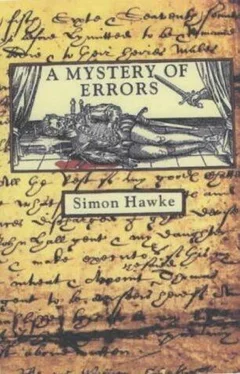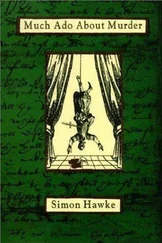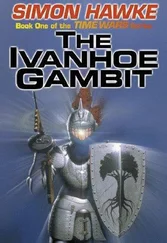Simon Hawke - A Mystery Of Errors
Здесь есть возможность читать онлайн «Simon Hawke - A Mystery Of Errors» весь текст электронной книги совершенно бесплатно (целиком полную версию без сокращений). В некоторых случаях можно слушать аудио, скачать через торрент в формате fb2 и присутствует краткое содержание. Жанр: Исторический детектив, на английском языке. Описание произведения, (предисловие) а так же отзывы посетителей доступны на портале библиотеки ЛибКат.
- Название:A Mystery Of Errors
- Автор:
- Жанр:
- Год:неизвестен
- ISBN:нет данных
- Рейтинг книги:3 / 5. Голосов: 1
-
Избранное:Добавить в избранное
- Отзывы:
-
Ваша оценка:
- 60
- 1
- 2
- 3
- 4
- 5
A Mystery Of Errors: краткое содержание, описание и аннотация
Предлагаем к чтению аннотацию, описание, краткое содержание или предисловие (зависит от того, что написал сам автор книги «A Mystery Of Errors»). Если вы не нашли необходимую информацию о книге — напишите в комментариях, мы постараемся отыскать её.
A Mystery Of Errors — читать онлайн бесплатно полную книгу (весь текст) целиком
Ниже представлен текст книги, разбитый по страницам. Система сохранения места последней прочитанной страницы, позволяет с удобством читать онлайн бесплатно книгу «A Mystery Of Errors», без необходимости каждый раз заново искать на чём Вы остановились. Поставьте закладку, и сможете в любой момент перейти на страницу, на которой закончили чтение.
Интервал:
Закладка:
“She certainly did not strike me that way.”
“No, no, of course not. But suppose she was. Not completely out of her mind, you know, but nevertheless, a little touched.” The poet tapped his temple with his forefinger. “Or if she were one of those shrewish women who tend to lie and shout and throw tantrums whenever they are not given their way. ‘Twould make her far less desirable as a wife, I should think. Especially if she had a reputation for such behavior.”
“I see!” said Smythe, realizing where the poet was going. “And if her father were a very wealthy man, then he might well be moved to increase the size of her dowry considerably, as an incentive for a prospective husband to take her off his hands!”
“You get my drift,” said Shakespeare.
“I do, indeed. Gresham makes her out to be touched in the head, or else failing that, a shrewish maid who would be nothing but a trial to her husband. He plays at following through with the arrangement, but at the last moment, seems to hesitate, as if having second thoughts as a result of Elizabeth ’s behavior. And her father, desperate to see them married so that he can make use of Gresham’s social stature, offers him more money to recompense him for the inconvenience he shall experience in trying to tame this shrew. The result: Gresham gets himself a pretty wife and a pretty windfall!”
“Perhaps even a piece of Darcie’s business, if he plays his cards right,” said Shakespeare. “You know, in a perverse sort of way, there is a kind of symmetry to all this. Darcie wants to marry off his daughter to a gentleman so that he can take advantage of the connection to advance himself, and Gresham wants to marry money. Each gets what he wants.”
“Except Elizabeth,” said Smythe, “who only gets used by both.”
“True, true,” said Shakespeare, nodding. “It really is too bad that you are not a gentleman. You think you could get Sir William to adopt you? If you could manage that, then you might just displace Gresham and the two of you could live happily ever after, even with her father’s blessing.”
“Were you planning on drinking that pot of ale or wearing it?” asked Smythe.
“Now you see how you are?” Shakespeare replied. “I do my utmost to help you with your lady’s problem, and arrange for your debut as a player, too, and you threaten to upend a pot of ale over my head. There’s gratitude for you.”
“I am grateful, Will,” said Smythe. “Truly. But… wait. What did you say just now? My debut as a player?”
“Well, ‘tis a walk-on, really, and only one line, but everyone has to start somewhere,” Shakespeare said.
“You got me a part in a play?” Smythe said, with disbelief.
“A very small part,” Shakespeare said, holding his thumb and forefinger about an inch apart.
“Will! An actual part in a play? However did you do it?”
“No need to get carried away now,” Shakespeare said. “They were very pleased with the job I did for them, as you just saw. And I wrote in a small part for you and asked if you could play it. They were dubious until I said that ‘twas only a small part in the second act, and they would not need to add another hired man. You could perform your duties as an ostler before the play begins, have plenty of time to come inside and change, come onstage, do your part, and then go back outside and help with the horses at the close. They were quite amenable, especially when they saw that you are a great, hulking, handsome chap who will doubtless make the ladies in the audience go all aflutter. And not only ladies. There is always a place in the theatre for tall, strapping fellows. With Alleyn gone, they need someone for the audience to gawk at, and while young Burbage is a decent looking sort, he is not the manly brute that you are.”
“I never know if you are serious or if you are teasing me,” said Smythe, with a grimace.
“I do both,” said Shakespeare, with a smile. He lifted his pot of ale. “Here’s to your debut.”
10
Elizabeth did not know from whence came this sudden, exhilarating boldness, and it both alarmed and pleased her at the same time. As she made her way home, she thought about what she had done and it seemed difficult to believe that she had really done it. She wondered what her father would do if he discovered that she had been at an inn, alone with a man, and a lowly ostler, no less. She could just imagine his reaction.
If he called her a slut, beat her bloody, and drove her out of the house, no one would question his right to do so. By any decent person’s standards of morality, she had disgraced herself and she had disgraced her family. But she did not feel disgraceful and she did not feel like a slut. She felt like a woman who had suddenly seized control of her own destiny and made her own choice about something. For far too long, all her choices had been made for her. For once, she had chosen for herself. And whether it had been a wise choice or not, it made her feel marvelously free.
She did not feel very close to either of her parents. Like many other children, she had been sent to live with another family when she was very young and did not return until she was nearly thirteen. This was considered a sound practice, for it kept parents from forming too close a bond with their children and thereby suffering from too much grief in the event those children should not thrive. And a great many children did not survive the first few years of infancy. Even adulthood was not without its risks, as the Plague demonstrated all too grimly every summer, so emotional attachments within families were best kept within reasonable bounds.
Still, though she had grown to know and understand all this, when she finally came home again, Elizabeth felt as if she had come home to strangers. She had seen the family resemblance, particularly with her mother, but the similarities between them seemed to go no further. And as Elizabeth grew older, she and her mother had continued to grow even farther apart. When she considered her mother now, she saw a vapid, vain, and foolish creature, a woman with whom she felt no real kinship, who cared much more about appearances than the way things truly were. And when her mother looked at her, Elizabeth knew she saw a daughter she could not even begin to understand.
Elizabeth wondered if there had ever been a time when her mother had felt the same way about things as she did. Had there ever been a time when she was young? There must have been, but it seemed difficult to credit. Sometimes, when she was looking at her mother, Elizabeth tried to imagine what she must have been like when she was young. She must have been a great deal like me, Elizabeth often thought, at least in her outer aspect. But inside, Elizabeth could not believe that they were anything alike. If she were to accept that her mother could have ever been anything like her, then it would have also meant accepting that something must have happened to change her into the woman she had now become. And that was a disturbing, even a frightening thought, because it implied that she might wind up the same way.
Elizabeth could not imagine being married to a man like her father. Although her father had never mistreated her in any way, and had provided a good home for her and seen to all of her material needs, neither had he shown her any affection. He seemed to care more for his sports, his fighting dogs, than he did for either her or for her mother. He was hardly ever home, tending to business during most of each day, and at night he went out socializing, ostensibly also to increase his business and make new contacts and connections with people who might help him advance himself. On those nights when he came home at a reasonable hour, all he did was issue orders to her mother and herself. And he was always finding fault and never seemed to have any shortage of complaints.
Читать дальшеИнтервал:
Закладка:
Похожие книги на «A Mystery Of Errors»
Представляем Вашему вниманию похожие книги на «A Mystery Of Errors» списком для выбора. Мы отобрали схожую по названию и смыслу литературу в надежде предоставить читателям больше вариантов отыскать новые, интересные, ещё непрочитанные произведения.
Обсуждение, отзывы о книге «A Mystery Of Errors» и просто собственные мнения читателей. Оставьте ваши комментарии, напишите, что Вы думаете о произведении, его смысле или главных героях. Укажите что конкретно понравилось, а что нет, и почему Вы так считаете.












